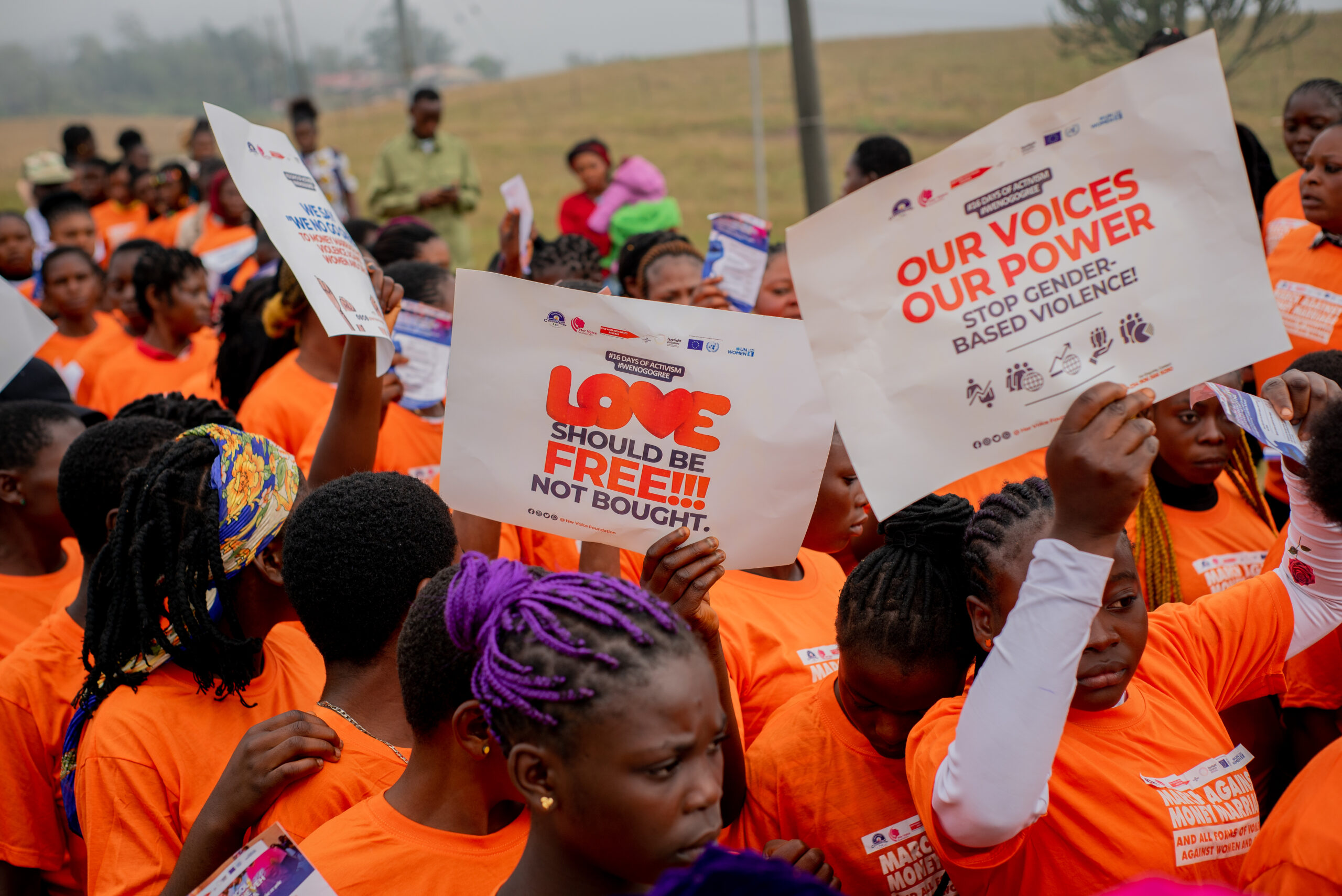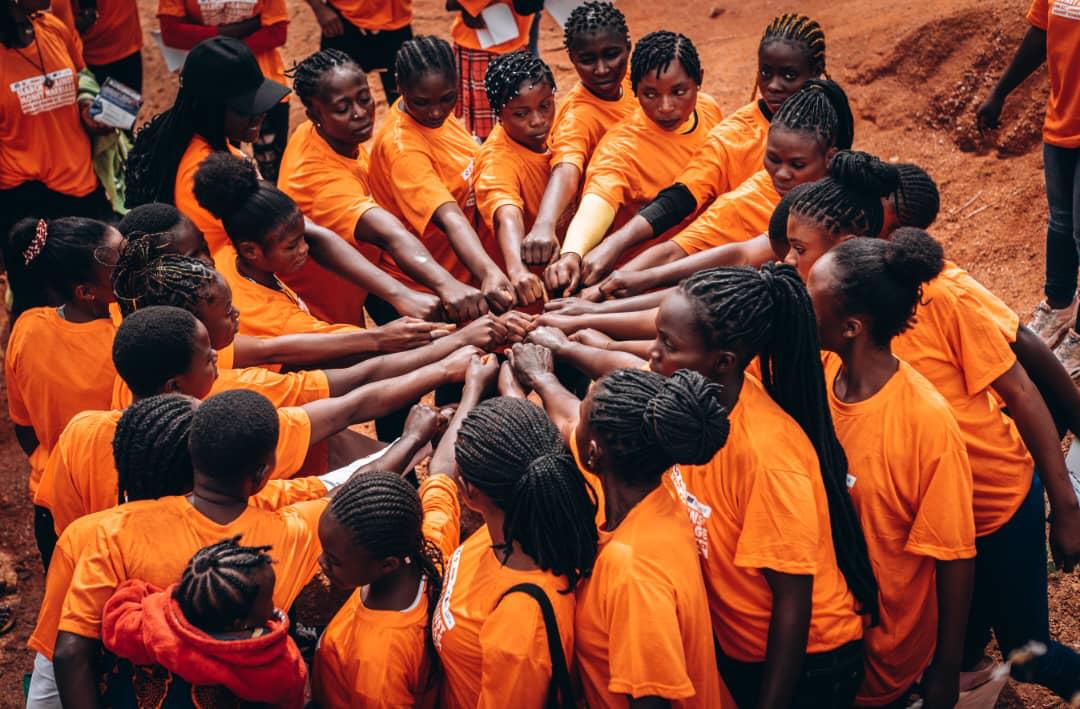A crowd of elderly men and women cheered loudly as a batch of 100 young women, aged 15–29, sidled up to the front of the vast community hall. Consisting largely of teenage mothers and survivors of repressive cultural practices, these young women were the graduating set of students provided with start-up kits following months-long training by Her Voice Foundation, an organization that empowers teenage mothers and out-of-school girls with alternative training in entrepreneurship.
Growing up in Obanliku, in the Nigerian state of Cross River, Favour Abatang regularly encountered young girls—quite as young as 12—bearing unintended pregnancies. Abatang observed that many of such adolescent mothers, scarred by the stigma of their condition, faced a despairing future of poverty, without complete education. “I saw a lot of girls dropping out of school and were unable to get back into school even after childbirth,” she recalled.
While adolescent birth rates have slumped in most parts of the world, they remain a significant health concern in sub-Saharan Africa. In 2021, more than 6 million births were recorded in the region among adolescent girls aged 10–19. A peer-reviewed study published in 2023 reported that Nigeria’s prevalence of adolescent pregnancy had hit nearly 50%, higher than Rwanda’s 7.2% and Congo’s 44.3%.
The factors responsible for this spike are just as varied as the teenage mothers themselves. Early marriages, tradition, and poverty represent the leading causes of adolescent pregnancies in Nigeria, according to the 2023 study. This medley of sociocultural factors held sway in Abatang’s hometown of Obanliku.
Surrounded by a range of mountains shrouded in thick clouds, Obanliku is the site of the Obudu Mountain Resort, a famous tourist destination. The picturesque town is composed largely of farmers cultivating yams and cassava and plantains and honey. In one community known as Becheve, a girl child from an indebted family is betrothed to an older adult in exchange for the debt of her indigent parents. The girl, labeled money woman, is condemned to a life of toil and servitude in her new environment.

In 2020, Favour Abatang founded Her Voice Foundation (HVF), a nonprofit to cater to adolescent mothers and the hapless victims of repressive traditional customs. “We wanted to ensure that we could provide second-chance opportunities to teenage mothers and girls at the risk of gender-based violence across the continent and reduce the number of adolescent births by fighting harmful cultural practices,” she said.
HVF’s second-chance opportunities, which are part of a two-pronged approach, involve enrolling affected adolescent girls again in school and curating an economic lifeline for them and their infants through entrepreneurship. The skills training, Abatang explained, helped to rescue the young mothers from the dire straits that marred their upbringing.
While it works to improve the lives of young mothers, HVF aims to stem the tide of the high incidence of adolescent pregnancy in the sub-Saharan region. “Our second approach is with regards to mobilizing stakeholders,” she said, “to ensure that harmful cultural practices like child marriages and female gender mutilation are put to an end.”
Between October and December 2023, HVF convened several town hall meetings that assembled traditional leaders from all Obanliku clans, including government stakeholders in Cross River State, to galvanize action against the lingering culture of money-marriage in the community. At the heart of the discussions was the implementation of the bye-laws that, if put to use, would punish perpetrators of the repressive custom.
HVF continued with its campaign focused on “educating men to engage in ending the money marriage practice” within the town.
“The campaign basically focuses on educating men and households on the role they can play in ending money marriage,” Abatang said.
So far, the foundation has held 12 such community outreaches in Obanliku, reaching over 200 households in 8 communities, using native languages like pidgin and Becheve dialects to bring its message home. At least 127 females—adolescent mothers and survivors of money marriages—have benefited from its second-chance education scheme. This is in addition to 130 adolescent mothers who have received considerable training in ventures such as tailoring and hairmaking, together with “start-up kits to begin their businesses,” added Ms. Abatang.
To mark the International Day of the Girl Child, in November 2023, more than 500 women and girls marched against money marriage and female violence under the aegis of HVF. Traversing the streets of Obanliku, the women poured their resolve into their battle cry: WeNoGoGree—a pidgin translation of Enough is Enough.

If HVF has given a new lease of life to hundreds of adolescent girls and young mothers, it has equally raised a network of volunteers shaped by the personal experiences with these young mothers.
At the time Ilu Janet joined the foundation in 2021, she struggled to face up with the crowds of young girls. As she recounted, continual dialogue with the women, alongside periodic meetings with political leaders, buoyed her confidence, honed her sense of empathy, and helped her to be more organized.
“It was when I started working with HVF that I realized that girls as young as 11 get pregnant. Now I talk to many young girls at any given opportunity so they don’t fall victim to these things,” said Janet, who directs HVF’s second-chance education.
HVF’s grassroots advocacy is sometimes faced with “pushbacks” from local households and communities blighted by money marriages.
“Some families do not even want you to interrogate their children, for example, survivors of money marriage,” Ms. Abatang bemoaned. “Sometimes, if you do not have the backing of the leader, it can become life-threatening.”
Still the non-profit foundation skates over “a plethora of issues,” one of which is human resources.
“As a young non-profit organization, we do have people who are willing to volunteer, but there’s a big gap between their expertise and the work that we do.”
Although HVF boasts a wide circle of volunteers, Abatang admitted that a shortage of expertise in areas such as monitoring and evaluation often poses a limit. “The process of getting people who are experienced to fill those roles is getting people you can pay and at the moment we’re unable to keep people on full salary except stipends.” she said. “So it becomes hard to get high-level experts.”
Amid these odds, however, HVF’s impacts continue to be heard on a monthly radio show that airs on the native radio station of the University of Calabar. Its Sexual and Reproductive Health and Rights education has left a footprint in 14 schools in Cross River, with over 6000 girls impacted.
Today, the foundation is gaining a remarkable presence in the southern country of Zimbabwe, raising a team of volunteers to lead the charge against misogynistic cultures. Yet that’s just a step in a determined stride to expand to more African countries, engage with more policymakers “to ensure we curb the harmful cultural practices in Africa and ensure that teenage mothers can access second-chance opportunities and regain control of their lives,” Abatang stated.
In Obanliku, Nigeria, the Her Voice Foundation (HVF) empowers teenage mothers and out-of-school girls through entrepreneurship training. Initiated by Favour Abatang, HVF provides second-chance education and start-up kits for economic independence. The foundation was founded in response to the high rates of adolescent pregnancies and harmful cultural practices like child marriages and money marriages.
HVF has organized town hall meetings with traditional leaders and government officials to combat these customs and educate men on their role in ending such practices. The foundation has also conducted community outreaches and launched campaigns against female violence, benefiting over 200 households and numerous adolescent mothers with education and vocational training.
Despite challenges such as resource limitations and pushbacks from affected families, HVF's impact extends to radio shows and educational programs, having reached over 6000 girls in Cross River state. The organization aims to expand its influence across Africa by collaborating with policymakers and volunteers to curb harmful cultural practices and support teenage mothers in regaining control of their lives.






